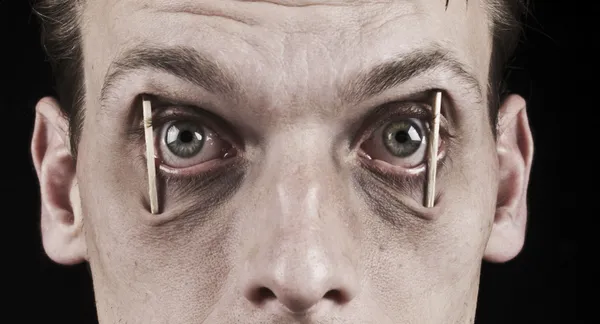Is Insomnia a Big Deal?

How Americans Deny Their Need for Quality Sleep
The human mind harbors an extraordinary capacity for self-deception. Within its complex mechanisms of reason, chronic insomnia and alcoholism share eerily similar patterns of denial and rationalization. Though seemingly unrelated, these conditions share a haunting psychological choreography—each step of postponement, each layer of identity formation, each whispered promise of spontaneous healing moving in perfect facsimile. Modern neuroscience reveals how these parallel struggles hijack the same neural circuits, creating protective shells of belief that simultaneously shelter and imprison their inhabitants.
The Voice of Tomorrow
Khurshid A. Khurshid, MD, a specialist in both sleep disorders and addiction, sees this pattern regularly in his practice. “The psychology is strikingly similar,” he explains. “Both the insomniac and the alcoholic live in a constant state of ‘tomorrow thinking.’ Tomorrow, they’ll get help. Tomorrow, things will be different. But tomorrow never comes until the suffering becomes unbearable.”
This perpetual postponement isn’t merely procrastination—it’s a complex psychological mechanism that protects the condition causing the suffering. Just as an alcoholic might say, “I’ll quit after this weekend,” the chronic insomniac thinks, “I’ll focus on my sleep after this project is done.” Both statements mask a more profound reluctance to confront the reality of their situation.
Identity in Suffering
Perhaps the most profound similarity lies in how both conditions become interwoven into the fabric of personal identity. Over time, the chronic insomniac, like the alcoholic, begins to define themselves through their struggle. “I’m just a bad sleeper” becomes as much a part of their self-image as an alcoholic’s relationship with drinking.
“What we see,” explains Dr. Jan Rémi, neurologist and sleep specialist, “is that the brain begins to reorganize itself around these patterns of dysfunction. The EEG readings of chronic insomniacs show distinctive patterns of disruption that become self-reinforcing over time.”
The Institutionalized Mind
An unexpected parallel emerges when we consider the psychology of long-term prison inmates. The phenomenon of institutionalization—where inmates become psychologically adapted to their confinement—bears striking similarities to how chronic insomniacs adapt to their condition.
Researchers who have studied both prison psychology and sleep disorders note: “The same psychological mechanisms that make freedom frightening to long-term inmates can make normal sleep patterns intimidating to chronic insomniacs. They’ve learned to live within their dysfunction, and the prospect of change, even positive change, triggers profound anxiety.”
This institutionalization manifests in the myriad of reasons insomniacs develop to avoid seeking help. Like prisoners who might fear life outside prison walls, chronic insomniacs often fear what life might be like without their familiar struggle. The devil they know becomes preferable to the unknown of recovery.
The Brain’s Distorted Reality

At the heart of chronic insomnia lies a fundamental disruption in the brain’s electrical patterns. EEG studies reveal how irregular brainwave activity creates a cascade of psychological symptoms. The mind, struggling to make sense of this disruption, often constructs elaborate narratives that seem logical to the sufferer but appear irrational to others.
Bradley F. Boeve, M.D., a pioneer in sleep neurology, explains: “What we see in EEG readings is fascinating. The disrupted brainwave patterns affect the brain’s reality-testing mechanisms. This is why insomniacs can maintain beliefs about their sleep that directly contradict evidence. Their brain is creating its distorted reality.”
These distortions manifest in various ways:
- Convinced they haven’t slept when sleep studies show they have
- Believing they function better without sleep
- Maintaining that their insomnia is unique and untreatable
- Insisting they’ve tried everything when they’ve avoided proven treatments
The Path of Resistance
When help finally arrives, both the alcoholic and the insomniac often react with a surprising mix of hope and resistance. The prospect of change, even positive change, triggers deep-seated fears. Dr. Martinez observes: “We see the same pattern of excuses, deflections, and rationalizations. ‘I’m too busy for treatment.’ ‘My insomnia is different.’ ‘I’ve tried everything.’ These are the same protective mechanisms we see in alcoholism.”
The EEG Connection
Understanding the role of brainwave patterns in chronic insomnia provides crucial insights into its persistence and treatment. Modern EEG studies reveal how chronic sleep disruption creates distinct patterns of neural dysregulation that become self-perpetuating over time.
“The brain’s electrical activity during chronic insomnia shows remarkable instability patterns,” explains Dr. Foster. “These patterns create a kind of neural feedback loop that maintains the sleep disruption, even when the original triggers are gone.”
Breaking Free Through Technology
This understanding of brainwave patterns has led to breakthrough treatments using amplitude-based neurofeedback. By directly addressing the disrupted EEG patterns, these interventions can help break the cycle of chronic insomnia.
The Sleep Recovery Program represents a comprehensive approach to addressing both the neurological and psychological aspects of chronic insomnia. Through a combination of neurofeedback and specialized coaching, the program helps participants:
- Stabilize irregular brainwave patterns
- Reduce sleep-related anxiety
- Break the cycle of dysfunctional sleep beliefs
- Rebuild healthy sleep architecture
Wendy Williams, a program participant, shares: “After fifteen years of chronic insomnia, I’d built my whole identity around being a ‘bad sleeper.’ “I even went as far as strategically complaining about my insomnia to gain attention from others. Thankfully, Sleep Recovery helped me understand that this wasn’t who I was—it was just a pattern my brain had fallen into. Learning about the EEG patterns helped me separate my identity from my condition.”
The Journey to Recovery
Recovery from chronic insomnia, like recovery from alcoholism, requires both courage and support. The first step often involves acknowledging how the condition has shaped one’s identity and being willing to imagine a different way of being.
As Dr. Khurshid emphasizes: “Just as we wouldn’t expect an alcoholic to recover through willpower alone, we shouldn’t expect chronic insomniacs to fix their sleep through mere determination. The neurological patterns need to be addressed directly.”
Hope and Healing
The good news is that the brain’s plasticity can change these patterns. Chronic insomniacs can find their way back to healthy sleep through targeted interventions like amplitude-based neurofeedback combined with psychological support.
The journey isn’t always easy. Like the alcoholic facing their first day of sobriety, the chronic insomniac must confront their fears about who they are without their familiar struggle. But with proper support and understanding, recovery is not just possible—it’s probable.
A New Understanding
Is insomnia a big deal? The answer lies not just in its physical effects but in its profound psychological impact. By understanding its parallels with other chronic conditions, particularly alcoholism, we can better appreciate both its grip and the path to recovery.
For those trapped in the cycle of chronic sleeplessness, know that your struggle is understood. The voice telling you to wait until tomorrow is part of the condition, not a reflection of reality. Help exists, and the possibility of rediscovering who you are beyond the identity of a “bad sleeper.”
Ultimately, the journey to better sleep is also a journey back to yourself—to the person you were before insomnia became part of your identity. And while that journey may seem daunting, you don’t have to walk it alone.
References:
- Sleep-Related Disorders in Neurology and Psychiatry. https://pmc.ncbi.nlm.nih.gov/articles/PMC6865193/
-
Drugs, sleep, and the addicted brain. https://www.nature.com/articles/s41386-019-0465-x
-
Understanding the relationship between sleep deprivation and addiction. https://sleepeducation.org/understanding-relationship-between-sleep-deprivation-addiction/
- Infralow neurofeedback in the treatment of substance use disorders: a randomized controlled trial. https://pmc.ncbi.nlm.nih.gov/articles/PMC9343117/
-
The effects of alpha/theta neurofeedback on personality and mood. https://pubmed.ncbi.nlm.nih.gov/15820636/
